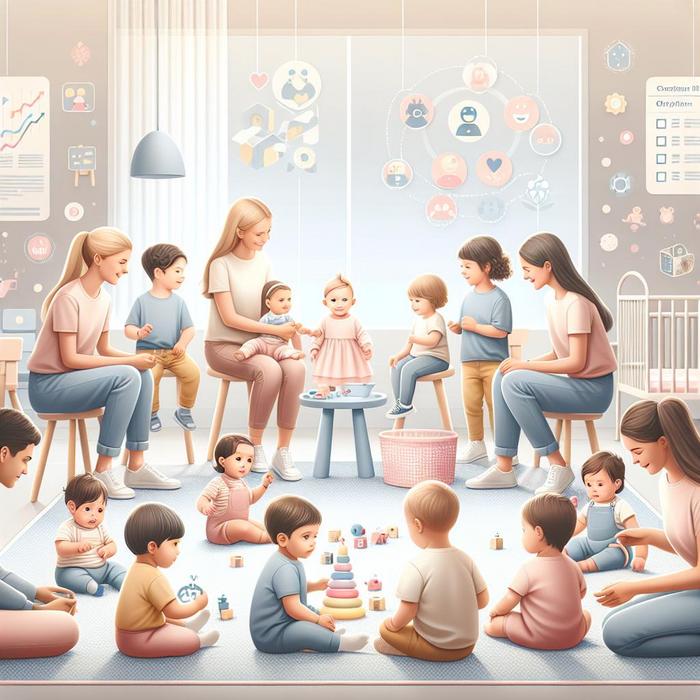Understanding the Benefits of Playdates
From the moment our little ones are born, we as parents take on this mammoth responsibility of nurturing them. We monitor their physical growth while also trying to foster their emotional and psychological well-being. Part of this nurturing process involves socializing babies. This is where playdates come into the picture.
Studies show that playdates provide more than just an opportunity for our little ones to have fun. Here is why incorporating playdates in your child’s routine can be rewarding:
- Development of social skills: Playdates provide an excellent platform for babies to interact with their peers, which helps in honing their social skills, such as sharing and understanding others’ emotions.
- Boost to creativity: These interactions often involve games and activities that stimulate creativity and problem-solving skills.
- Physical development: Activities during playdates often involve a lot of movement, thus promoting physical development and coordination.
Setting Up a Successful Playdate
Organizing playdates can seem like a daunting task, especially if this is your first time. Let’s delve into how you can create a fun and stimulating environment for your little one and their friends:
- Create a safe and engaging play space: Prioritize safety while ensuring the space is engaging. You might find our tips on creating a baby-friendly play space helpful for this.
- Have an array of toys and games: A variety of toys will keep the children occupied and engaged. Make sure these toys are age-appropriate and safe.
- Keep some snacks handy: Healthy and tasty snacks can keep the energy levels up during a playdate.
Understanding Your Role During Playdates
As parents, our role during playdates is to facilitate and oversee the event. Here are a few pointers on what we can do to ensure a successful and enjoyable playdate:
- Be present, but don’t interfere: Allow children to interact freely with each other. However, step in if you sense rising tensions or safety concerns.
- Encourage sharing and turn-taking: This is a key aspect of developing social skills. Encourage your child and their friends to share toys and take turns during play.
- Don’t force interactions: Let your child take their time to warm up to the other children. Pushing them may make them uncomfortable.
The Wonderful Journey of Socialization
Socializing your baby is both a fun and imperative aspect of their overall development. It’s a beautiful journey filled with moments of shared laughter, first friendships, and invaluable lessons in empathy, sharing, and communication. Remember, the benefits of playdates go beyond just the playdate itself. These interactions precipitate lifelong skills and traits that will help your child thrive in a social environment.
The Magic of Playdates: Perfect for Early Social Skills
Playdates are definitely not all about just games and toys. In fact, they are a cocktail of learning opportunities that offer several cognitive and emotional benefits for children. Within these seemingly ordinary meetings, there is the magic of building social skills. The importance of introductions, greetings, basic etiquette, and expressing oneself — everything is absorbed and learnt during these early socialization meets.
Most importantly, playdates serve as a mirror for children to see themselves, their actions, and behaviors through others. They learn the virtue of negotiation and develop a sense of self-identity versus others. In the process, they also enjoy the freedom of choice and decision-making, picking their favorite toys or games, thus boosting their confidence.
Timing Matters: When to Start?
While many parents wonder “At what age should infants have playdates?”, experts say that it’s never too early to start. Even though the interaction between infants may appear to be limited, the stimulation and variety offered by the novel environment and faces enrich the brain and senses.
The shift from parallel play (playing alongside but not with each other) to cooperative play (playing together) is gradual and significant, and this transition is beautifully witnessed and nourished during playdates.
Promoting Mental Health Through Playdates
Modern research emphasizes the role of playdates in promoting children’s mental health. A study highlights that participating in social activities like playdates helps children handle stress better, cope with challenging situations, and build resilience.
These interactions also promote conditions for the development of emotional intelligence — the ability to handle, express, and understand emotions. Apart from an intellectual understanding of emotion through play, children also learn to deal with emotion in a practical manner such as managing conflict, overcoming disagreements, and engaging in problem resolution.
Tips for an Effective, Successful Playdate
Schedule playdates at appropriate times when the children are well-rested and not too hungry. Duration can vary between one to three hours depending on the children’s age and relationship.
- Arrange a mix of organized and spontaneous games: Too much structure can feel like school; let the kids lead the play sometimes.
- Pre-plan activities: Marketplace role-play, crafting, and outdoor games are great ways to keep kids engaged and entertained.
- Hands-on activities: Activities like sensory play, puzzles, or gardening help refine kids’ motor skills.
The most important tip of all is, keep it simple. The benefits of playdates are manifold and come naturally from interaction, so there’s no need to stress over creating a meticulously planned, perfect playtime.
In essence, playdates are more than just a social commitment on your calendar. They are a vital part of your child’s journey to becoming a socially competent individual. And as parents, we are privileged to be the guiding hands that help them navigate this journey.

